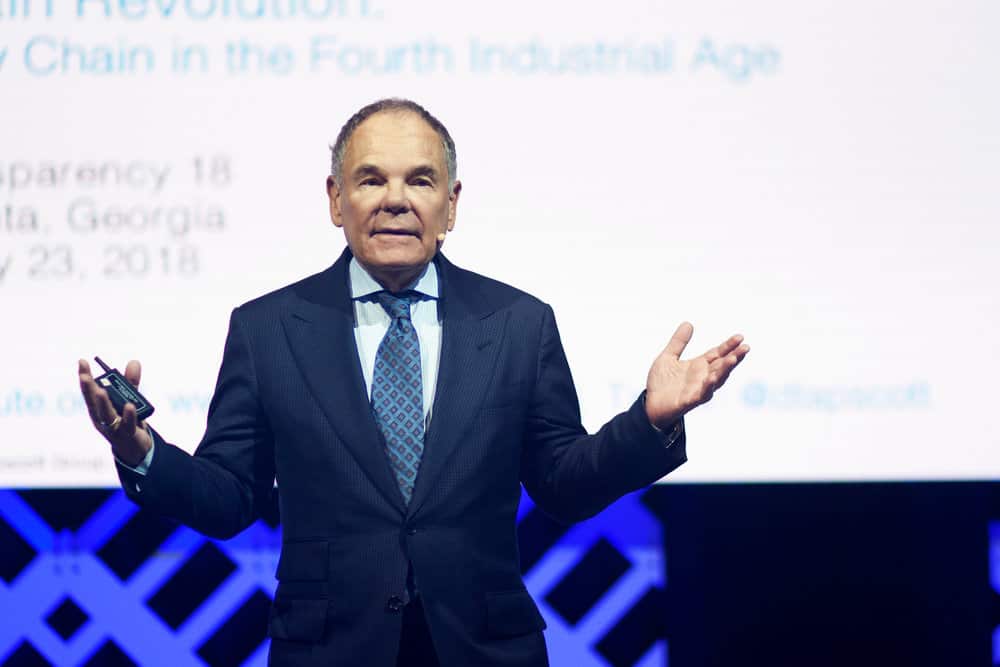
Don Tapscott gave the third keynote address on Wednesday morning at Transparency18, leveraging his decades of expertise in how information technology transforms businesses to offer a bold vision of blockchain-powered commerce. Tapscott is the co-founder and executive chairman at the Blockchain Research Institute and the author of The Blockchain Revolution: how the technology behind bitcoin is changing money, business, and the world (2017, 2nd ed. 2018), as well as many other books about technology and business.
Tapscott began his talk with a nod to the theme of the conference. “Transparency is a powerful new force for good; sunlight is the best disinfectant. You want to get naked as a company, and when you’re naked, well, fitness is no longer optional,” he said.
“We noticed that when you open up supply chains and make things more transparent, a lot of good things happen: you reduce the number of lawyers, you speed up the metabolism of the supply chain, and you reduce the error rate,” Tapscott continued.
Freight logistics and supply chains are about to undergo a fundamental, technology-driven transformation, Tapscott claimed. He said that the industry has already applied several layers of technology, from EDIs to the internet, but these have really just automated existing processes without changing the underlying structure of companies or the way they operate.
Tapscott called for the advent of the ‘fourth industrial revolution,’ which builds on the digital advances of the past few decades to further integrate technology into human societies and bodies. “Technologies of the fourth industrial revolution include machine learning, animating the physical world, autonomous vehicles, distributed energy, technology in our bodies, virtual reality, and drones and robotics,” Tapscott said. “But the foundational technology of the fourth industrial revolution is the technology underlying cryptocurrency: blockchain.”
“So far, we’ve had the internet of information and been able to share things like photos, websites, .pdf files, documents, PowerPoint slides, and voice recordings. But on the internet of information, we aren’t sharing things in themselves, but copies. We’re going to transition to an internet of value, where we’re moving actual assets around, like money, coupons, loyalty points, carbon credits, intellectual property, art, bonds, stocks, and even things like votes and our very identities,” Tapscott forecasted.
But how will this fundamentally change businesses? Tapscott said that the largest, wealthiest corporations in the world have grown in size and power due to the asymmetric capturing of information—Facebook knows more about your personality and habits than you do; your bank knows where you spend money; if you have a GPS-enabled iPhone, Apple knows exactly where you go every single day. A blockchain-driven economy has the potential to return the control, management, and monetization of that data back into the hands of the entities that create it, whether they’re individual people or small businesses.
“We think blockchain is leading to a change in the nature of the firm, in its deep architecture: by moving assets around in this decentralized way, companies and industries are going to look more like networks, and that has profound implications or this audience,” said Tapscott. Even the nature of corporate competition may change, as enterprises realize they have more to gain from distributing data and encouraging the flow of digital assets than siloing and hoarding them.
Tapscott said that Turing-complete smart contracts will even allow machines to interact with each other, identifying opportunities, negotiating contracts, and settling payments. “When that lightbulb over there purchases power from a distributed electrical grid, its reputation as trusted lightbulb will be enhanced,” Tapscott prophesied.
But to truly realize the potential of blockchain, corporate leaders will have to rise to the occasion. “Paradigm shifts involve dislocation, conflict, confusion, uncertainty. New paradigms are nearly always received with coolness, even mockery or hostility. Those with vested interests fight the change. The shift demands such a different view of things that established leaders are often last to be won over, if at all,” Tapscott concluded.
Stay up-to-date with the latest commentary and insights on FreightTech and the impact to the markets by subscribing.
